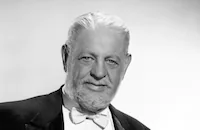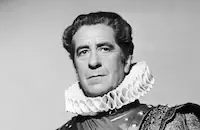Counsel for Crime
Brief Synopsis
Cast & Crew
John Brahm
Otto Kruger
Douglass Montgomery
Jacqueline Wells
Thurston Hall
Nana Bryant
Film Details
Technical Specs

Synopsis
Following his graduation from law school, Senator Robert Maddox's adopted son Paul is offered a job at Bill Mellon's law firm. Mellon, an unscrupulous criminal lawyer, is actually Paul's real father, but keeps the fact a secret from him. When gambler Georgie Evans tells Mellon that he has just killed a man named Harrison in self-defense, Mellon advises him to turn himself in, and tells him exactly what say to keep him from going to prison. Mellon assigns Paul to handle Evans' case, and while Paul is on his way to police headquarters, Mellon, who lied about having killed Harrison, deliberately murders Harrison and makes it look as if he committed it in self-defense by following Mellon's prescribed advice on how to tell the story to the police. Though Mellon later discovers that he has been duped by Evans, he nevertheless agrees to let Paul defend him for a high price. Paul, unaware of his client's guilt, defends him in court and wins his acquittal. When Paul learns that he helped set a guilty man free, he resigns from Mellon's firm and gets a job as assistant district attorney. Soon after taking the position, Paul spearheads an investigation into legal malpractice, which worries Mellon and prompts him to assign Mitchell to implicate those investigating them in a scandal. Mitchell finds evidence that Mrs. Maddox is Paul's real mother, but when he refuses to hand it over to Mellon, Mellon and he fight over it and Mitchell is accidentally shot by his own gun. Paul successfully prosecutes his own father, who is convicted of second-degree murder because he refused to discuss the content of the papers over which he and Mitchell were struggling. After the sentencing, Mellon has Mrs. Maddox swear an oath of secrecy so that Paul will never know that his real father was sent to jail for a crime he did not commit.

Director

John Brahm
Cast

Otto Kruger

Douglass Montgomery

Jacqueline Wells

Thurston Hall

Nana Bryant
Gene Morgan
Marc Lawrence

Robert Warwick
Stanley Fields
Crew
Irving Briskin
Harold Buchman
Lambert Day
Henry Freulich
Kalloch
Lee Loeb
Wallace Macdonald
Otto Meyer
William Mull
Grace Neville
Fred Niblo Jr.
Harold Shumate
Morris Stoloff
Carl Zint

Film Details
Technical Specs

Articles
Marc Lawrence (1910-2005)
Born Max Goldsmith on February 17, 1910, in the Bronx, Lawrence had his heart set on a career in drama right out of high school. He enrolled at City College of New York to study theatre, and in 1930, he worked under famed stage actress Eva Le Gallienne. Anxious for a career in movies, Lawrence moved to Hollywood in 1932 and found work immediately as a contract player with Warner Bros. (an ideal studio for the actor since they specialized in crime dramas). He was cast as a heavy in his first film, If I Had a Million (1932). Although his first few parts were uncredited, Lawrence's roles grew more prominent: a sinister henchman in the Paul Muni vehicle in Dr. Socrates (1935); a conniving convict aiding Pat O'Brien in San Quentin (1937); a menacing thug stalking Dorothy Lamour in Johnny Apollo (1940); the shrewdly observant chauffeur in Alan Ladd's breakthrough hit This Gun For Hire (1942); and one of his most memorable roles as Ziggy, a fedora wearing mobster in the Bogart-Bacall noir classic Key Largo (1948).
Lawrence, when given the opportunity, could play against type: as the prosecuting attorney challenging Tyrone Power in Brigham Young (1940); a noble aristocrat in the Greer Garson-Walter Pidgeon period opus Blossoms in the Dust; and most impressively, as a deaf mute simpleton in the rustic drama The Shepherd of the Hills (both 1941). Better still was Lawrence's skill at comedy, where his deadpan toughness worked terrifically as a straight man against the likes of Joe E. Brown in Beware Spooks (1939); Abbott and Costello in Hit the Ice (1943); Penny Singleton in Life with Blondie (1945); and Bob Hope in My Favorite Spy (1951).
After that, Lawrence's career took a turn downward spin when he was labeled a communist sympathizer during the Hollywood witch hunts of the early '50s. He was exiled in Europe for a spell (1951-59), and when he came back, the film industry turned a blind eye to him, but television overcompensated for that. Here he played effective villains (what else?) in a series of crime caper programs: Peter Gunn, Johnny Staccato, The Untouchables, Richard Diamond, Private Detective; and eventually made a welcome return to the big screen as a returning exiled gangster in William Asher's underrated mob thriller Johnny Cool (1963).
It wasn't long before Lawrence found himself back in the fray playing in some big box-office hits over the next two decades: Diamonds Are Forever (1971), The Man with the Golden Gun (1974), Marathon Man (1976), Foul Play (1978); and The Big Easy (1987). Sure he was cast as a gangster, but nobody could play a rough and tumble mob boss with more style or conviction.
Interestingly, one of his finest performances in recent years was in television, as a severely ill old man unwilling to accept his fate in a fourth season episode of ER (1997-98). His last screen role was just two years ago, as a nimble minded VP in Looney Tunes: Back in Action (2003).
In 1991, Lawrence published a memoir about his venerable career, Long Time No See: Confessions of a Hollywood Gangster that received much critical acclaim. He has also developed a cult following due to his appearances in such offbeat items as From Dusk to Dawn and Pigs aka Daddy's Deadly Darling, the 1972 horror film he directed and starred in with his daughter Toni. He is survived by his wife, Alicia; two children from a previous marriage, Toni and Michael; and a stepdaughter Marina.
by Michael T. Toole

Marc Lawrence (1910-2005)
Quotes
Trivia
Notes
This film was reviewed under the title The Man Behind the Law in a pre-release Motion Picture Herald article.














